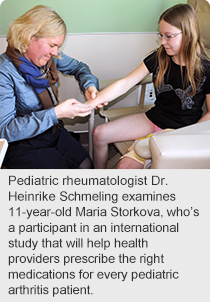
February 14, 2014
Story by Greg Harris; Photo by Paul Rotzinger
Maria Storkova was eight years old when she experienced some pain in her ankles when she was out hiking.
A year later, her older sister, Magdalena, encountered some difficulties playing piano.
“I had a piano exam that I needed to practise for but I couldn’t because my hands were bothering me,” Magdalena says.
The two sisters, now 11 and 14, are among the roughly 350 patients with pediatric arthritis who are seen each year at Alberta Children’s Hospital in Calgary.
Today the girls have their condition well under control and are back hiking and making music. They are also taking part in an international research study that’s trying to find out if there are genetic markers that might one day let doctors come up with a test to determine which medications will be the best for each patient.
“Currently there is no way of knowing how individual children will respond to medication,” says Alberta Health Services pediatric rheumatologist Dr. Heinrike Schmeling, who is leading the study.
“What we need is a way of determining in advance what the safest and most effective treatment will be for each child.”
The illness can be well controlled with the medications now available, once doctors determine which will be the most effective and have the fewest side effects for the patient. It’s a trial-and-error process that can sometimes take up to a year.
Speed is of the essence in treating arthritis; the earlier it can be brought under control, the better the long-term prospects. If it goes untreated too long, it can damage bone and cartilage, and affect a child’s growth. Although there is no cure, it can go into remission for long periods.
Arthritis is often thought of as an ailment of the elderly but it’s the most common autoimmune disorder in children. It’s estimated about one in 1,000 children will develop pediatric arthritis.
Swollen joints are the most common symptom seen in children but there are sometimes more serious complications, such as inflammation of the heart, eyes and other organs.
In the study, researchers are collecting and analyzing saliva samples in children with arthritis to try to find genetic markers that might predict response to medication. In Calgary, researchers are hoping to recruit about 300 children to the study.
Dr. Schmeling established the first Early Childhood Arthritis program in Canada. Her research project includes sites in Germany, Toronto and Calgary. It is supported by the Alberta Children’s Hospital Foundation, the ACH Research Institute for Child and Maternal Health, the McCaig Institute for Bone and Joint Health, the Canadian Arthritis Network and the Canadian Institutes of Health Research.
For more information on participating in the study, contact the research co-ordinator, Dwaraka Veeramreddy, at 403-955-3194 or dwaraka.veeramreddy@albertahealthservices.ca.